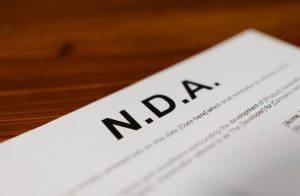NDA in Israel
Are you getting an NDA in Israel? NDAs, or non-disclosure agreements, are legal documents that protect information people or companies wish to keep confidential.
This article will go through various elements about an NDA, including alternative names for this document, what it is, why it’s important, and what is important to include in an NDA in Israel based on our experience working with companies in Israel and abroad.

Various names for NDAs in Israel
NDAs in Israel can go by a number of names. It can be referred to as a confidentiality agreement (CA), proprietary information agreement (PIA), or secrecy agreement.
What is an NDA?
A non-disclosure agreement is a contract between a minimum of two parties indicating how specific information may or may not be used. It is often used when two companies or individuals engage in a business relationship and want to share confidential information they want to ensure will not be disclosed. An NDA can protect proprietary or other important information.
Who does an NDA apply to?
An NDA can be unilateral or mutual. In a unilateral NDA, one individual or company is barred from disclosing confidential information. In a mutual NDA, both parties are barred from disclosing confidential information.
It is important to note that NDAs do not apply in a number of specific cases: for example, if the information is in the public domain, the NDA does not apply; if the party signing the NDA (also called the recipient) already had lawful access to this information; or, if a court of law requires that this information be disclosed.
What does an NDA in Israel include?
NDAs in Israel, similar to those in other countries, include a few key sections. This includes but is not limited to the following: the parties, details about the confidential information, the obligations of the parties, the terms of the agreement, dispute resolution, and remedies (or injunctive relief). We go into further details below.
The parties
This section details who is involved in the agreement. There are two key parties: the disclosing party and the receiving party. The disclosing party is the one sharing confidential information. The receiving party is the one receiving confidential information. In the case of a mutual non-disclosure agreement, each party can varyingly be a disclosing and receiving party depending on when they disclose/receive the information.
Definition of confidential information
This section defines what is confidential. It can include technology, trade secrets, documents, designs, strategies, concepts, customer and/or supplier information, and more. Be as specific as possible when defining this. It can also detail how this information is given. For example, noting that this information can be disclosed either directly or indirectly, orally, electronically, in writing, or in another form.
Exceptions to confidential information
At times, this is a sub-section of the confidential information, and at times, this is a separate section. This section details what is not considered confidential. It can note that exceptions are information in the public domain, what becomes part of the public domain in the future at the choice of the disclosing party, information that the receiving party already has access to, and more. Be specific when detailing these terms.
Obligations of the receiving party
This section can detail the exact obligations the receiving party commits to.
Termination or term of the agreement
This section is important as it details the duration of the NDA, particularly when it expires. For example, it can indicate that either party can terminate the agreement in writing if one party breaches the agreement and does not resolve it within one month of the written notice.
Dispute resolution
This section explains what law applies in the event of a dispute. In Israel, this should indicate that the agreement is governed by the laws of the state of Israel and also where the agreement should be resolved; for example, in the appropriate court in the Jerusalem or Tel Aviv area. (If you are unfamiliar with Israel’s general law courts, see a brief overview and list of the district courts on this government page on the judiciary in Israel.)
Remedies
This section describes what will happen if one party breaches the agreement, becoming the defaulting party. It can indicate monetary or other damages that can be pursued. If the breach is very sensitive and monetary damages do not suffice, it may be necessary to pursue injunctive relief.
Limitations of NDAs
There are a number of limitations to NDAs that are important to keep in mind. While NDAs are important contracts to utilize, if someone breaches the contract and divulges proprietary information or information the disclosing party sought to patent but had not yet done so, this can undermine their work. It is therefore important, even when using an NDA, to divulge as little information as possible. If you have very sensitive information or that you intend to patent, consider patenting the information prior to divulging this in the context of the NDA. This can provide some further protection to you.
Contact us
NDAs are important tools to use in business partnerships, employment relationships, and various negotiations. If you would like legal assistance with your NDA in Israel, please contact us. We have extensive experience with corporate and contract law, and we would be happy to help you.
מאמרים מומלצים

